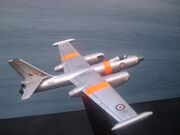The People's Republic of Ireland (PRI) was the name given to the Republic of Ireland during the period where the Irish People's Party was in power. They held power between 1973 and 1977 when they were toppled by a coup.

The People's Republic of Ireland (red)
Rise to Power[]
During the early 1970's the face of traditional Irish politics was thrown into disarray with the massive growth of the new Socialist Irish People's Party (known as Daoine hÉireann Páirtí in Irish). Fueled by their all inclusive rhetoric and their willingness to stand up to their powerful UK neighbour the party initially proved popular because of its foriegn policies which rallied the people who supported them.
In 1974 the Party won 33% of the vote in the local elections in Dublin and 23% nationwide, next year they cashed in on this result and managed to split both traditional parties taking enough votes from either to form a Minority govenment. Several key politicians of both parties were tempted to the new National Govenment with promises of positions and ministries though none of the major positions such as defence and foreign affairs. These remained strictly the position of those who had been members from the beginning and were extremist in their views.
Eastern Politics and Terrorism[]
The new govenment pursued a set of policies more close to traditional Eastern European govenments than the more pedestrian Irish norm including an increased support to terrorist groups north of the border. The PRI wholeheartedly rejected British rule of Northern Ireland declaring them as 'occupied territory'. PRI support materialised in increased weapon deliveries and the formation of training camps in the south of the country, safe from the eyes of the SAS, or so they thought.

The People's Republic of Ireland supported terrorists in Northern Ireland
The situation in Ireland carried on along these lines with the country slowly moving into the Eastern Block. The UK kept a strong watchful eye on all that was happening in the Republic and increased it's border security accordingly, as well as increasing SAS and Commonwealth special forces involvement in the south in tackling IRA and INLA supporters and training camps.
Life Under Communist Rule[]
In the early days of the PRI the there was general support for the new Communist regieme which quickly went about instigating several high profile and popular socialist policies which seemed to benefit many of the ordinary people. However these same socialist policies shut down many businesses across the wide range of the economic scale and unemployment rose steadily.
The Beagle Incident[]
On March 5th 1977 the Irish Minister of Defence annonced to the world at a press conferance that the Irish Air Corps would take delivery in the name of the Peoples Irish Republican Army, 5 Ilyushin IL-28 Beagle medium bombers as a means of "taking the struggle to the Brits". The Ministry of Defence in the UK responded with the Statement that "...not one of these aircraft will become operational and they will never be a threat to any part of the UK".
World Response
For the rest of the world that was more or less the end of the matter. The Soviet Union who was supplying the aircraft liked the idea of the once pro-US Ireland becoming a de-facto Communist state but was concerned about alienating the Commonwealth. Vowing to fight Communism the US threatened sanctions but did little to reinforce these threats.
UK Response[]
The UK again increased it's rediness and deployed even more SAS patrols into Ireland. Incredibly, they recieved help not only from much of the population at large but also from the Garda and elements of the Defence Force itself. The UK had not anticipated just how unpopular the government had become.
Stealing Beagles[]
On july 12th a Bulgarian freighter was spotted with a suspisious deck cargo and was followed by Nimrods and French Atlantic patrol aircraft through the Med and into the Atlantic where it was shadowed all the way to Ireland by a RN submarine. The deck cargo was unloaded at the port of Dublin and then road freighted to the Air Corps base at

Former Irish 'Beagle' captured by the British in an SAS raid
Baldonnal where they disappered into a hanger.
Intelligance gathered from very reliable sources told the UK that the aircraft would be rolled out on the 7th of September. It was decided that on the night of the 6th the SAS would storm the airfield, hold it and fly the aircraft out to the UK under cover provided by the RAF and RCN carriers in the irish sea. The operation was an overwhelming success and all six Il-28 'Beagles' were flown to the UK where they were used by the RAF.
Political Fallout[]
The fallout from the operation was obvious. The government had not support from its own people who felt tthat they were losing their freedom. The government tried to quash subsequent protests against them but the Garda didn't follow out all their orders.
The Coup[]
In mid-1977 the Garda began refusing to follow official orders to tackle the protests. The government now existed entirely on paper and soon collapsed. The Mayor of Dublin was put in brief charge of the country while democratic elections were held for a new government sworn in on January 7th 1978.
Afterward[]
Though the UK had provided over 90% of the aid that helped to topple the Peoples Republic it was the small

Protests outside the British embassy in Dublin
vocal US support which stuck in peoples minds and it was this perception that led Ireland to move firmly into the US camp. This was reinforced by the Northern Ireland situation which was deteriorating in the late 70s. This US support eventually lead to the basing of US aircraft in Ireland and US special forces operating on the border of the UK mainland. US influence eventually lead to anti-British sentiments growing in the Republic of Ireland despite the UK's help.
